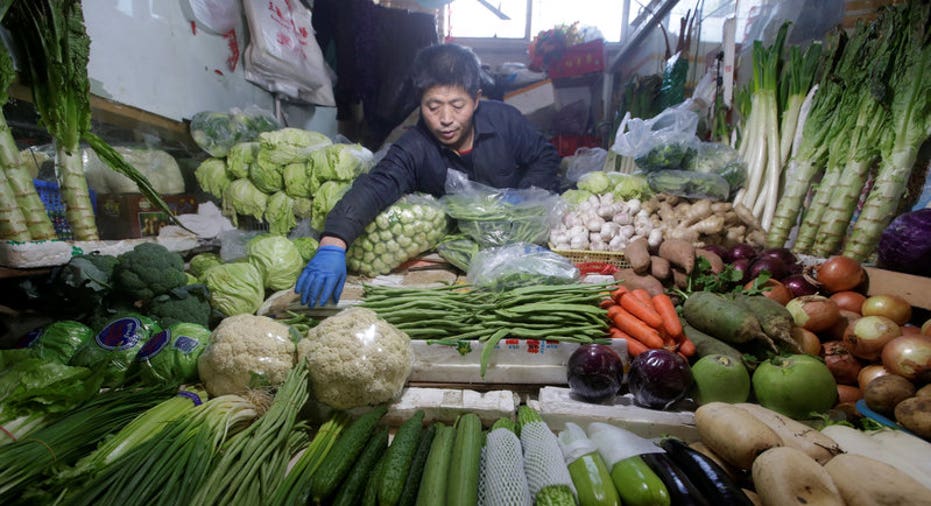China vows to contain corporate debt levels as inflation heats up

BEIJING – China vowed on Tuesday to contain high company debt levels and further cut excess coal and steel capacity, as Beijing attempts to maintain solid and more balanced economic growth while avoiding destabilizing asset bubbles.
The world's second-largest economy likely grew around 6.7 percent last year -- roughly in the middle of the government's target range -- but it faces increasing uncertainties in 2017, the head of the country's state planning agency told a news briefing.
Global investors are buzzing over whether China's leaders will be willing to accept more modest growth this year, amid worries about the risks from years of debt-fueled stimulus driven by the political obsession with meeting official targets.
China's credit growth has been "very fast" by global standards, and without a comprehensive strategy to tackle the debt overhang there is a growing risk it will have a banking crisis or sharply slower growth or both, the International Monetary Fund said in October.
"Although the domestic economy is stable and improving, it still faces contradictions and problems," said Xu Shaoshi, the top official at the National Development and Reform Commission NDRC).
"We have the confidence, conditions and ability to ensure the economy operates within a reasonable range."
Xu said China will not allow debt of non-financial firms to rise beyond current levels, and will step up efforts to encourage companies to restructure their debts. China's corporate debt has soared to 169 percent of gross domestic product (GDP).
China's leaders are likely to accept growth this year of around 6.5 percent, policy insiders say.
In theory, that would give the government more room to focus on tackling the nation's debt pile, and on tamping down speculation that was seen last year in the housing, commodities and debt markets.
But an official tap on the brakes that is too vigorous would threaten to stall economic momentum.
SPECULATORS DRIVE SPIKE IN PRODUCER PRICES
After a rough start to 2016, China's economy performed better than many economists had expected, with higher government infrastructure spending, a housing rally and record lending by state banks fuelling a construction boom.
Producer prices, in particular, saw a stunning turnaround, emerging in September from nearly five years of deflation and helping to boost reflationary pressures worldwide.
That helped put the long ailing manufacturing sector on steadier footing, boosting profits and giving factories more cash flow to whittle down a mountain of debt.
Data on Tuesday showed producer prices continued to rise as 2016 drew to a close, with producer inflation surging 5.5 percent in December year-on-year, the fastest in more than five years, as the prices of coal and building materials soared.
Along with a rebound in demand, state-mandated cuts in industrial capacity have helped fuel the spike in prices.
But some analysts worry the strong gains may also be driven by growing speculation in commodities futures markets, adding to the broader risk of bubbles in China's economy even as leaders attempt to control explosive debt growth.
"I don't think there's an inflation issue in China, it's an asset bubble," said Commerzbank senior emerging market economist Zhou Hao in Singapore.
While the NDRC's Xu said on Tuesday that China will put more pressure on coal and steel firms to reduce overcapacity this year, analysts at ANZ predict higher prices and fatter profits may thwart those efforts.
"Producers are tempted to fire their engines again in the face of rising prices. The government will not fully welcome the rapid recovery of the PPI," said ANZ economists David Qu and Raymond Yeung in a note.
GLOBAL REFLATION, HIGHER INTEREST RATES?
For the first time in nearly five years, economists at HSBC have raised their forecast for global growth and inflation, encouraging by robust manufacturing activity, a resilient China and above all the fiscal boost expected to come in the United States under incoming President Donald Trump.
Hopes of stronger spending under Trump are sparking expectations of stronger U.S. economic growth and inflation, with more interest rate hikes seen from the Federal Reserve.
A sharp jump in borrowing costs would heighten the risk of loan defaults, though China's producer price recovery has not yet started filtering into consumer prices, suggesting its central bank will not be under pressure to tighten monetary policy as soon, analysts say.
"A sharp increase in inflation at the start of 2017 may fuel speculation that rising price pressures will soon force the People���s Bank into more aggressive policy tightening. But
we think the pick-up will mainly be driven by movements in commodity prices and is unlikely to be sustained," economists at Capital Economics said in a research note.
Commerzbank's Zhou said that a bubble in commodities, led by coal and steel prices, could complicate policy decisions if economic growth slows and some easing of monetary conditions is needed.
But policy insiders already expect a tilt towards more conservative monetary policy this year as top leaders struggle to strike a balance between supporting the economy with ample credit and slowly trying to defuse the risks posed by the rapid debt build-up.
The NDRC's Xu said on Tuesday China will further push forward its debt-to-equity swap program this year as it looks to cut the debt burden on companies.
The PBOC has reaffirmed it would keep liquidity in the financial system stable while taking steps to prevent asset bubbles and financial risks in its annual work meeting for 2017.
(Reporting by Kevin Yao and Elias Glenn; Editing by Kim Coghill)



















